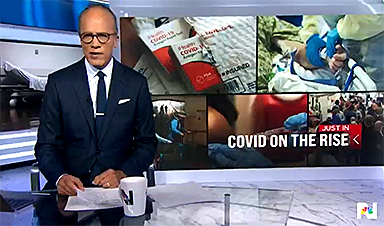Scientists can now show key differences in the blood of those who recover from Covid — and those who don’t.
More than three years into the pandemic, the millions of people who have suffered from long Covid finally have scientific proof that their condition is real.
Scientists have found clear differences in the blood of people with long Covid — a key first step in the development of a test to diagnose the illness.
The findings, published Monday in the journal Nature, also offer clues into what could be causing the elusive condition that has perplexed doctors worldwide and left millions with ongoing fatigue, trouble with memory and other debilitating symptoms.
The research is among the first to prove that “long Covid is, in fact, a biological illness,” said David Putrino, principal investigator of the new study and a professor of rehabilitation and human performance at the Icahn School of Medicine at Mount Sinai in New York.
Dr. Marc Sala, co-director of the Northwestern Medicine Comprehensive Covid-19 Center in Chicago, called the findings “important.” He was not involved with the new research.
“This will need to be investigated with more research, but at least it’s something because, quite frankly, right now we don’t have any blood tests” either to diagnose long Covid or help doctors understand why it’s occurring, he said.
Putrino and his colleagues compared blood samples of 268 people. Some had Covid but had fully recovered, some had never been infected, and the rest had ongoing symptoms of long Covid at least four months after their infection.
Several differences in the blood of people with long Covid stood out from the other groups.
The activity of immune system cells called T cells and B cells — which help fight off germs — was “irregular” in long Covid patients, Putrino said. One of the strongest findings, he said, was that long Covid patients tended to have significantly lower levels of a hormone called cortisol.
A major function of the hormone is to make people feel alert and awake. Low cortisol could help explain why many people with long Covid experience profound fatigue, he said.
“It was one of the findings that most definitively separated the folks with long Covid from the people without long Covid,” Putrino said.
The finding likely signals that the brain is having trouble regulating hormones. The research team plans to dig deeper into the role cortisol may play in long Covid in future studies.
Meanwhile, doctors do not recommend simply boosting a person’s cortisol levels in an attempt to “fix” the problem.
“There is no evidence that replacing cortisol in someone with long Covid would be a safe or effective thing to do,” Sala said.
The study also found that dormant viruses, such as the one that causes mononucleosis, Epstein-Barr, come alive again in long Covid patients. It’s unclear, however, whether those old viruses are causing symptoms or flagging a problem within the immune system.
“We were looking for signals, and we found them,” said Akiko Iwasaki, one of the researchers and a professor of immunobiology and molecular, cellular and developmental biology at the Yale School of Medicine. “Now what we need to do is home in on each of these signals and understand better how the disease has been driven by these signals.”
The investigators did not find significant evidence that long Covid is the result of an autoimmune disorder, in which the body attacks itself.

Dr. Clinton Wright, director of the National Institute of Neurological Disorders and Stroke’s division of clinical research, said additional studies will be necessary to find other ways Covid may lead to long-term symptoms. One theory is that the virus is hiding in brain tissue or other organs.
“We’re really interested in whether the virus still exists in reservoirs in the body,” he said. “It’s really hard to do that by measuring blood.” He was not involved with the new study.
Long Covid affects 1 in 13 U.S. adults, or 7.5%, according to the Centers for Disease Control and Prevention.
The findings offer hope to patients like Joshua Roman, 39, of New York City, who participated in the study.
“We’re in such a mysterious swamp of symptoms,” he said. “My long Covid treatment is just management of symptoms.”
Roman, a professional musician who plays the cello, takes daily medication to ease the lingering physical trembling that affects his ability to perform.
“It would be great if we could get to the thing that’s causing me to shake in the first place, but we still don’t know exactly what that is,” he said.
News
New Once-a-Week Shot Promises Life-Changing Relief for Parkinson’s Patients
A once-a-week shot from Australian scientists could spare people with Parkinson’s the grind of taking pills several times a day. The tiny, biodegradable gel sits under the skin and releases steady doses of two [...]
Weekly injectable drug offers hope for Parkinson’s patients
A new weekly injectable drug could transform the lives of more than eight million people living with Parkinson's disease, potentially replacing the need for multiple daily tablets. Scientists from the University of South Australia [...]
Most Plastic in the Ocean Is Invisible—And Deadly
Nanoplastics—particles smaller than a human hair—can pass through cell walls and enter the food web. New research suggest 27 million metric tons of nanoplastics are spread across just the top layer of the North [...]
Repurposed drugs could calm the immune system’s response to nanomedicine
An international study led by researchers at the University of Colorado Anschutz Medical Campus has identified a promising strategy to enhance the safety of nanomedicines, advanced therapies often used in cancer and vaccine treatments, [...]
Nano-Enhanced Hydrogel Strategies for Cartilage Repair
A recent article in Engineering describes the development of a protein-based nanocomposite hydrogel designed to deliver two therapeutic agents—dexamethasone (Dex) and kartogenin (KGN)—to support cartilage repair. The hydrogel is engineered to modulate immune responses and promote [...]
New Cancer Drug Blocks Tumors Without Debilitating Side Effects
A new drug targets RAS-PI3Kα pathways without harmful side effects. It was developed using high-performance computing and AI. A new cancer drug candidate, developed through a collaboration between Lawrence Livermore National Laboratory (LLNL), BridgeBio Oncology [...]
Scientists Are Pretty Close to Replicating the First Thing That Ever Lived
For 400 million years, a leading hypothesis claims, Earth was an “RNA World,” meaning that life must’ve first replicated from RNA before the arrival of proteins and DNA. Unfortunately, scientists have failed to find [...]
Why ‘Peniaphobia’ Is Exploding Among Young People (And Why We Should Be Concerned)
An insidious illness is taking hold among a growing proportion of young people. Little known to the general public, peniaphobia—the fear of becoming poor—is gaining ground among teens and young adults. Discover the causes [...]
Team finds flawed data in recent study relevant to coronavirus antiviral development
The COVID pandemic illustrated how urgently we need antiviral medications capable of treating coronavirus infections. To aid this effort, researchers quickly homed in on part of SARS-CoV-2's molecular structure known as the NiRAN domain—an [...]
Drug-Coated Neural Implants Reduce Immune Rejection
Summary: A new study shows that coating neural prosthetic implants with the anti-inflammatory drug dexamethasone helps reduce the body’s immune response and scar tissue formation. This strategy enhances the long-term performance and stability of electrodes [...]
Scientists discover cancer-fighting bacteria that ‘soak up’ forever chemicals in the body
A family of healthy bacteria may help 'soak up' toxic forever chemicals in the body, warding off their cancerous effects. Forever chemicals, also known as PFAS (per- and polyfluoroalkyl substances), are toxic chemicals that [...]
Johns Hopkins Researchers Uncover a New Way To Kill Cancer Cells
A new study reveals that blocking ribosomal RNA production rewires cancer cell behavior and could help treat genetically unstable tumors. Researchers at the Johns Hopkins Kimmel Cancer Center and the Department of Radiation Oncology and Molecular [...]
AI matches doctors in mapping lung tumors for radiation therapy
In radiation therapy, precision can save lives. Oncologists must carefully map the size and location of a tumor before delivering high-dose radiation to destroy cancer cells while sparing healthy tissue. But this process, called [...]
Scientists Finally “See” Key Protein That Controls Inflammation
Researchers used advanced microscopy to uncover important protein structures. For the first time, two important protein structures in the human body are being visualized, thanks in part to cutting-edge technology at the University of [...]
AI tool detects 9 types of dementia from a single brain scan
Mayo Clinic researchers have developed a new artificial intelligence (AI) tool that helps clinicians identify brain activity patterns linked to nine types of dementia, including Alzheimer's disease, using a single, widely available scan—a transformative [...]
Is plastic packaging putting more than just food on your plate?
New research reveals that common food packaging and utensils can shed microscopic plastics into our food, prompting urgent calls for stricter testing and updated regulations to protect public health. Beyond microplastics: The analysis intentionally [...]





















